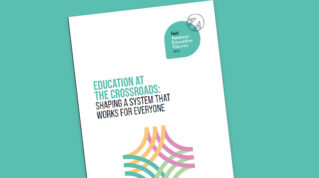As deputy CEO of a trust comprising mainstream, special and alternative provision, I would love to be working within a system – and indeed in a society – where permanent exclusions were never needed.
In an ideal world, schools, agencies and health professionals would have the funding and resources required to ensure every single child had their needs met from day one, in mainstream education wherever possible. Children with special educational needs would receive timely diagnoses and have appropriate measures put in place, in the right setting for them, to ensure that they could learn and reach their potential.
Sadly, the reality is very different. The number of children being diagnosed with both SEN and mental health issues is increasing exponentially, with more complex presentations than ever before. And the resources are not in place to respond.
The pandemic is in part to blame, but so is the wider support system, which is buckling under the increased pressure. Numbers of EHCPs are increasing at alarming rates and fewer are meeting the 20-week statutory assessment timeline. Waiting times for CAMHS are also at an all-time high.
Not all exclusions can be attributed to undiagnosed or misdiagnosed special educational needs. Children are excluded for a variety of reasons from threatening behaviour to serious assault. For the safety and wellbeing of other pupils, staff and for the good order of a school, leaders must have the option to remove a young person permanently in such extreme circumstances. Boundaries ultimately provide safety, so I worry that a total ban on exclusions would make leaders powerless and endanger others.
A ban would make headteachers powerless and endanger others
However, it is also true that many more young people struggle in schools who would benefit from a very different approach. We work closely with our three local authorities and schools across the region. Every year, our highly skilled outreach team trains hundreds of mainstream staff to identify and deal with pupil issues before the final point of permanent exclusion – helping many more children to remain in their school than otherwise would.
The overwhelming majority of these children have some sort of SEN – most likely undiagnosed and manifesting itself in difficult and problematic behaviour.
Schools need the expertise and the funding to identify and address these needs, with support from other agencies to ensure an entirely holistic approach. But this type of specialist support is rarely affordable, even before factoring in the current squeeze on budgets due to unfunded pay increases, huge rises in energy costs and other inflationary pressures.
We are already seeing much younger children in our alternative provision setting. This includes five- and six-year-olds who have not been in school for long but are already at risk of permanent exclusion, unable to access learning in a mainstream classroom.
As a result, APs like ours are in many cases functioning more like SEND intervention services, looking after young people who can’t cope with mainstream education while they await assessment and diagnosis of SEN. This is not only inappropriate; it clearly contravenes Ofsted’s and CQC’s new Local area review consultation and proposal.
Mainstream schools would be able to do so much more if they had the resources. More funding for specialist support and expertise would enable schools to put interventions in place and tackle the cause of the problem, rather than having no choice but to remove its manifestation, ie. the child.
The principle of a zero-exclusions policy is an admirable idea. I am wholly in favour of giving every young person the help and support they need to ensure they can attend school, stay in school, access an appropriate curriculum, achieve positive outcomes and lead fulfilling lives.
But in many ways it is also a distraction from the more pressing problem of ensuring schools and other agencies have the necessary funding to tackle the many issues sitting behind challenging behaviour: special educational needs, but also wider social deprivation and its attendant consequences including drug/alcohol/physical abuse and mental health issues.
A flat zero-exclusion policy alone won’t improve these things and schools haven’t got the resources to do it by themselves. We need a better funded, more joined up system if we are to give these children and young people the support they need and deserve.














Your thoughts